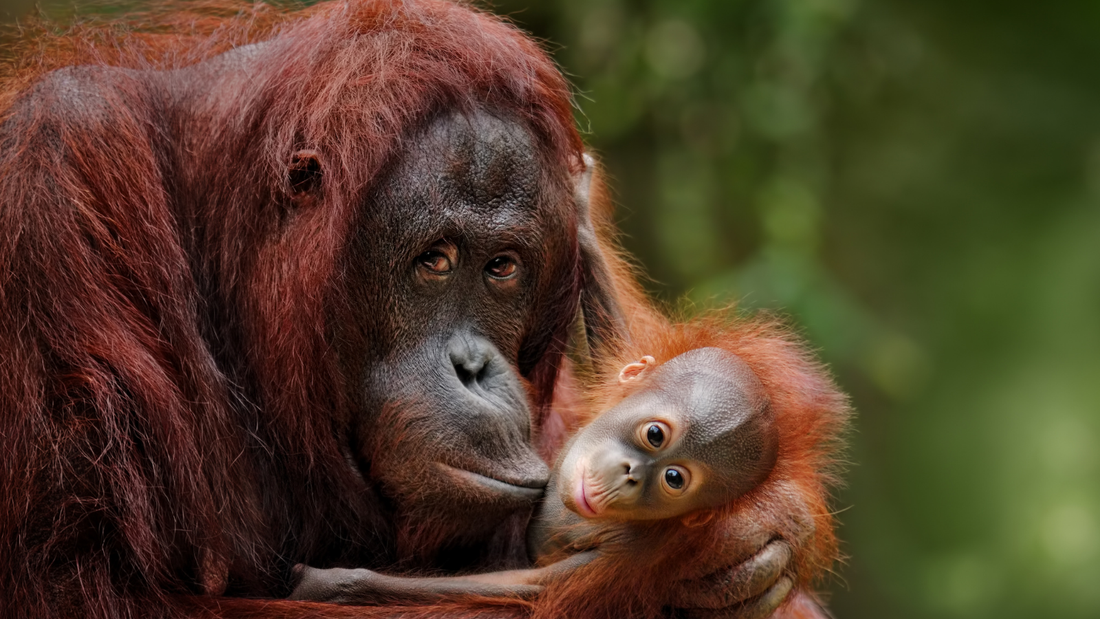
The Healing Wisdom of Orangutans: Why Protecting Them Matters Now More Than Ever
Share

Orangutans: Nature’s Silent Herbalists
Orangutans—meaning “person of the forest” in Malay—are among the most intelligent and emotionally expressive creatures on Earth. Native to the rainforests of Borneo and Sumatra, these great apes share nearly 97% of human DNA and demonstrate incredible cognitive abilities.
But what’s truly remarkable is that they’re now being recognized for something even more profound:
Their ability to identify and use medicinal plants to heal themselves.
The First-Ever Case of Wild Animal Self-Healing
In 2024, scientists documented something extraordinary in the Sumatran rainforest. A male orangutan, named Rakus, sustained a wound on his face. Over the course of a few days, he was observed:
- Chewing the leaves of Fibraurea tinctoria (locally known as Akar Kuning),
- Spitting the paste onto his wound, and
- Repeating this self-treatment until the wound healed without signs of infection.
This is the first known case of a wild animal using a biologically active medicinal plant to treat a wound — a discovery published in Scientific Reports in May 2024.
🔗 View the study
The plant Fibraurea tinctoria has long been used in traditional herbal medicine for its anti-inflammatory, antibacterial, and antioxidant properties. That an orangutan could identify and apply this plant medicinally speaks volumes about the intelligence embedded in natural ecosystems.
But These Gentle Forest Dwellers Are in Crisis
Despite their brilliance and the lessons they offer about nature’s healing systems, orangutans are critically endangered.
Current Conservation Status (2024):
- Sumatran Orangutan: Critically endangered
- Bornean Orangutan: Endangered
- Tapanuli Orangutan: Critically endangered (fewer than 800 left)
Threats to Survival:
- Deforestation from palm oil, logging, and illegal mining
- Habitat fragmentation cutting off breeding populations
- Illegal wildlife trade
- Forest fires worsened by climate change
Why Orangutans Matter (Even Beyond the Rainforest)
Orangutans are more than just another species — they are ecological keystones:
- They help disperse seeds, maintaining rainforest biodiversity
- Their presence indicates a healthy ecosystem
- Their behavior offers insight into natural medicine, primal intelligence, and the interconnectedness of life
When we protect orangutans, we protect entire forest ecosystems—the same forests that are home to rare medicinal plants, some of which may hold the cures of tomorrow.
What the Science Says About Orangutan Intelligence & Healing
- A 2024 study showed orangutans apply medicinal plants intentionally, selecting specific species for wound care.
🔗 Scientific Reports – Rakus Case Study - Research on their tool use and behavioral flexibility shows orangutans possess self-awareness, empathy, and long-term memory, rivalling some of the most intelligent mammals.
🔗 Science Advances – Tool Innovation in Orangutans - Observational studies link their dietary choices to self-regulation of gut health, parasites, and inflammation — showing instinctive self-medication.
🔗 American Journal of Primatology – Zoopharmacognosy in Apes
What Can Be Done to Help
✅Support forest conservation
Organizations like Rainforest Trust, Sumatran Orangutan Society, and Borneo Orangutan Survival Foundation work directly to protect and restore orangutan habitats.
✅ Choose ethically sourced products
Palm oil, illegal wood, and unsustainable herbal harvesting contribute to rainforest destruction. Supporting ethical sourcing practices helps reduce pressure on orangutan environments.
✅ Spread awareness
Education is the first step toward empathy. Share stories like Rakus’s. Talk about rainforest destruction. Advocate for environmental policy changes.
Final Thoughts: Protecting the Keepers of the Forest
Orangutans offer more than wonder — they offer wisdom.
They remind us that healing is already woven into the forest, if only we protect it.
Their instinct to self-medicate isn’t just a biological marvel — it’s a symbol of harmony between living beings and the earth. A harmony now under threat.
The survival of orangutans is not just a conservation issue — it’s a call to reconnect with nature, respect its intelligence, and preserve its gifts for future generations.
📚 Scientific References
- Laumer, I. B., et al. (2024). Self-treatment of a facial wound with a medicinal plant by a wild orangutan. Scientific Reports.
https://www.nature.com/articles/s41598-024-58988-7 - Chappell, B. (2024). A wounded orangutan used plants to heal his own injury. NPR.
https://www.npr.org/2024/05/03/1248879197/orangutan-wound-medicinal-plant-treatment - Kuncoro, R. et al. (2020). Ecological role of orangutans in seed dispersal. Biodiversitas.
https://smujo.id/biodiv/article/view/6832 - Huffman, M.A. (2016). Self-medicative behavior in animals: Evidence and analysis. American Journal of Primatology.
https://onlinelibrary.wiley.com/doi/10.1002/ajp.22561


 https://ayurvance.com
https://ayurvance.com